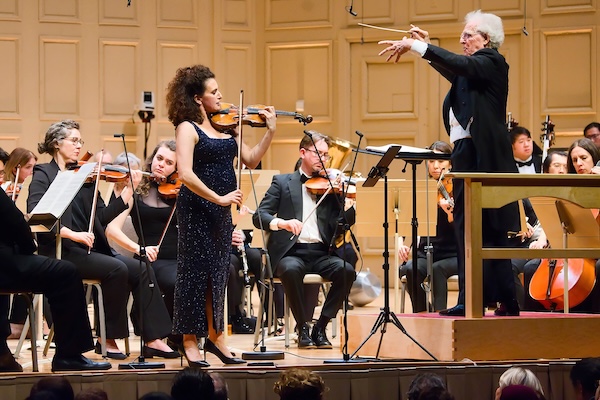Boston Philharmonic goes from grief to triumph at Symphony Hall

Liza Ferschtman performed Berg’s Violin Concerto with Benjamin Zander and the Boston Philharmonic Orchestra Saturday night. Photos; Hilary Scott
The Boston Philharmonic explored many variations of musical modernism Symphony Hall on Saturday night. Conductor Benjamin Zander and violin soloist Liza Ferschtman provided a program that placed the many approaches to the cultural shifts occasioned by the turn of the 20th century in productive contrast, from Ravel’s atmospheric elegance and Mahler’s thematic innovation to Berg’s atonal romanticism.
The first half of Saturday night’s program dealt in grief and memory, including Ravel’s Pavane pour une infante défunte and Berg’s Violin Concerto, subtitled “In Memory of an Angel,” written in tribute to Manon Gropius. The program juxtaposed Ravel’s carefully crafted harmonies and melodic repetition with the precise atonality of Berg in an exploration of both the emotional overwhelm and cognitive dissonance of loss.
In spite of the delicacy of Zander’s interpretation, the opening Pavane felt tentative and restrained. This piece belongs to a particular Ravellian genre of work whose thematic material grows slowly in intensity over time. The orchestra’s tendency to emphasize the endings of phrases and the restricted dynamics seemed to short-change the piece’s larger emotional impact.
The performance of the Berg Violin Concerto that followed was a stronger offering, with Ferschtman bringing a lucid interpretation that was a striking contrast to Ravel’s gentle sorrow. The orchestra captured both the precision of Berg’s music and the Romanticism of his style in a way that made Berg’s carefully curated catharses seem accidents of fate–and made those moments all the more emphatic.
Ferschtman’s performance fully explored the complexities of grief potential in the piece. The relationship she developed with the ensemble in the first movement grew into what seemed like a powerful assay in individual consciousness under the enormous pressure of sorrow that the loss of a young person occasions. Ferschtman navigated the melodic and structural difficulties of the piece with perfect confidence and security, allowing the audience to engage in the strangeness and difficulty of the piece in its emotional nuances. Her conclusion of the third movement—a stricken lullaby—offered a kind of comfort in the piece’s own memorialization of lost life to the audience without abandoning the anguish of the previous movements.
Ferschtman meditated on the twinned themes of grief and hope in her encore, which she prefaced by noting the second anniversary of the war in Ukraine. Her performance Ysaÿe’s Sonata for solo violin, Sunrise/L’Aurore embodied, with its cyclical arpeggiation, the hope that comes from persistence. The encore was the perfect combination of Ravel and Berg, linking the abstract and affective in a moving conclusion.
The second half of the program transitioned from the innovations of Ravel and Berg to the formal innovations of Mahler’s First Symphony (“Titan”). Like Berg, Mahler preserves the stylistic Romanticism of the preceding century, while fragmenting and re-arranging the thematic and formal elements of the traditional symphony.
The BPO’s performance here was superb. Mahler’s First is a Zander specialty, which was fully obvious in Saturday night’s performance. The orchestra, too, was at the height of its powers here. If the ensemble held back its might in the Ravel, the Mahler was a stunning testament to the ensemble’s force. The horn section led the charge here with absolute confidence under the superb leadership of first horn Kevin Owen, joined by an excellent performance by the trumpets, trombones, and brass.
The winds too, shone, with the stylish performance in the klezmer interlude of the third movement by clarinetist Hunter Bennett and the confident leadership of principal oboist Peggy Pearson, principal flutist Vanessa Holroyd, and principal bassoonist Rachel Juzczak. Timpanist Edward Meltzer was essential to the proceedings, keeping the orchestra honest from below.
After a charming first movement, Zander drove the orchestra into the rollicking second movement—where, once again, the horn section showed to advantage. The patient repetitions of the third movement paid off in a spectacular fourth movement finale, which felt a total celebration of Mahler’s ability to preserve harmonic resolution and thematic dissonance. The final notes of the brass drove the audience immediately to its feet—the triumph of life and love in the face of life’s confusion.
The Boston Philharmonic Youth Orchestra performs music of Britten, Tchaikovsky, Ives and Ravel 3 p.m. March 3 at Symphony Hall. bostonphil.org
Posted in Performances
Posted Feb 28, 2024 at 5:04 pm by Howard Schwartz
We were there for the Feb 25 concert. I agree with all the points made in this review. The Mahler was superb and Lisa did a great job. Don’t miss the Youth orchestra with the great Anna Fedorova.